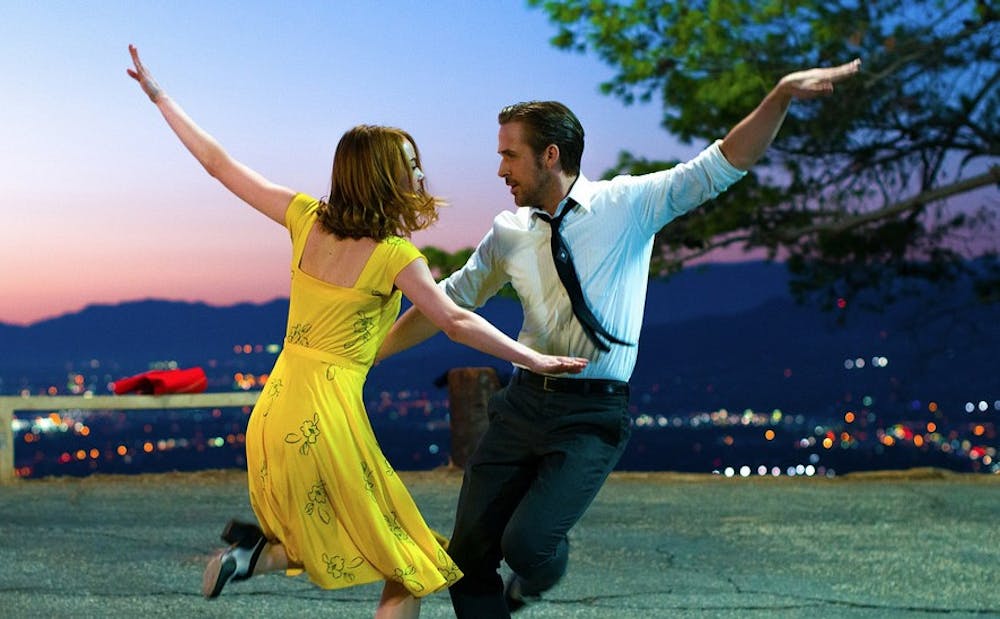Cancel the Rose Parade. I know “La La Land” has earned the undying praise of critics, the Academy and lovers of symmetrical faces everywhere, but all that is over now. There’s a new sheriff in Tinseltown, and his name is TWMUWTTP (The White Male Undergrad Writing This Think Piece).
You may expect TWMUWTTP to have nothing but praise for “La La Land.” After receiving 14 Oscar nominations (!?), the film has catapulted to the upper reaches of the Things White People Love power rankings (resting snugly between golf and British musicians with sex appeal). But TWMUWTTP is a rare breed. He knows a problem when he sees one. And "La La Land" had its share of problems.
Before I give this film the smackdown it deserves, I want to stress that there are no gray areas in film criticism. Just as it is a totally valid exercise to deem one of the year’s pictures “best,” if TWMUWTTP takes any issue with any aspect of a film, that means you should not go see it. And if any friend of yours suggests that you go see it, you should give that friend the ol’ Dick Spencer treatment.
PROBLEM THE FIRST: Why does the salvation of jazz fall on the shoulders of Ryan Gosling?
We get it, director Damien Chazelle. You dig jazz, and that makes you incredibly interesting. But for someone whose entire film career is predicated on the love of a music genre, Chazelle asks strikingly few questions about his work’s orientation toward the subject of his affection. TWMUWTTP is not saying that it is essentially problematic for Ryan Gosling, a white, Caucasian, non-black man, to play jazz’s white, Caucasian, non-black savior. After all, that would imply that Ryan Gosling is fallible.
Yet it is strange that if a person who knew nothing about jazz were to see “La La Land,” she might have no idea that the transcendent genre was largely forged in the crucible of American black oppression. The movie is only tangentially about jazz, so this oversight is merely a deal breaker rather than the subject of a Supreme Court case. (I’m still waiting to hear back from my lawyers about Russell Crowe ruining the film version of “Les Mis.” Step up, RBG!) But still.
TL;DR, if you want to have a nuanced conversation about “saving” jazz, it’s kinda weird to not remark on the fact that a white dude is spearheading the conversation.
PROBLEM THE SECOND: Emma Stone’s character does everything Ryan Gosling’s character says.
Emma Stone’s character, Mia, is a struggling actress. Gosling’s character, Sebastian says (I’m paraphrasing), “Keep struggling. Creative passion is fuel for the soul.” So Mia does. Then Seb says, “JK, grow up.” So Mia moves home from LA. Then he says, “Disregard what I said about growing up. You must be an actress even though the film thus far has offered little evidence that you have talent.” So Mia returns and becomes a star. Female agency is a tricky pickle. Actually, no it’s not. Just give females some agency.
TWMUWTTP recognizes that Emma Stone’s Mia is an actress. Her need for approval may merely be a symptom of the disease of the stage. Still, when a film released in the year of our Lord Justise Winslow 20 seems unaware of the fact that its female protagonist acts pretty much exclusively on the wishes of its male protagonist, that is a problem. And because of that problem, you are not allowed to pass go, collect $200 or like this movie.
PROBLEM THE THIRD: The entire movie is an orgy of Hollywood self-congratulation.
Did TWMUWTTP mention that “La La Land” got 14 Oscar noms? Think that’s a coincidence? Hollywood loves high-fiving itself for fueling America’s dreams. Yet a skeptic, and TWMUWTTP is nothing if not a skeptic, would argue that the film functions as a sort of Horatio Alger tale for struggling artists. “La La Land” tells us that we should be aware of Hollywood’s problematic ideals and anti-meritocratic structures, but we needn’t dwell on them. As long as we resign ourselves to a life of mediocre personal relationships and throw ourselves into the work (spoiler: Gos doesn’t get 'em dawg), any career is possible.
Of course, one could argue that the beauty of “La La Land” is in the struggle, not its realization. Songs function in the film as lovely daydreams; dialogue presents the often brutal reality of artistry. Both Sebastian and Mia achieve their respective dreams because they are zealously dedicated to their crafts, yes, but more importantly, they’re devoted to the larger idea that beauty is worth fighting for.
One could argue these points, they’d just be guilty of light treason punishable by, of course, death.
Quick tangent: TWMUWTTP is not denying that Chazelle, director of 2014’s “Bullying Sometimes Gets Results” (editor’s note: The film was titled, “Whiplash”) is unskilled in cinematography. Some of the shots in “La La Land” (read: all of the shots involving Ryan Gosling) are downright gorgeous. Chazelle is, indeed, a talented weirdo who makes films that are less than perfect. Therefore you shouldn’t see any of them.
Back to my enumeration of problems 4 through 99…
PROBLEM THE F—
(Editor’s note: this goes on for thousands of words more, but we’re going to shut it down here. It’s OK to like movies even if they’re imperfect, especially if we have an inclusive conversation about those imperfections. Let’s just skip to the end.)
Anyway, that’s why I should be elected president for not liking “La La Land” before it was cool to not like it. End of list.
Take that, beloved Hollywood movie. But more importantly, congrats to me, TWMUWTTP.
Get The Chronicle straight to your inbox
Sign up for our weekly newsletter. Cancel at any time.

